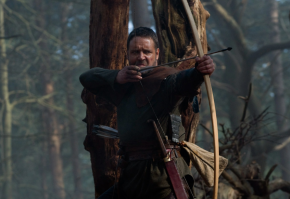Not my Robin Hood
explains why the real Robin Hood has nothing to do with Tea Partiers.
ROBIN HOOD is arguably the most enduring legendary figure in Western history. Since his first appearance in medieval English ballads as early as the 12th century, Robin Hood has enjoyed nearly uninterrupted popularity for the last 600 years. Just in the 20th century, he's been featured in some 50 live-action films, 15 TV series and 15 cartoons.
The Robin Hood legend has undergone numerous incarnations over the years, often serving as a vehicle for contemporary social commentary. From his origins as a crude yeoman in early ballads, later renditions upgraded him to a humanitarian nobleman.
In the 19th century, Sir Walter Scott cast him as an English nationalist hero, while romantic poets like John Keats claimed him for the side of the French Revolution.
Errol Flynn's iconic portrayal in the 1938 The Adventures of Robin Hood contained overt references to the fight against fascism, and in the 1950s, the popular British TV series of the same name provided work to U.S. screenwriters who had been blacklisted under McCarthyism.

The British Guardian's Tom Dewe Mathews recently unearthed the story, quoting one of these writers, Ring Lardner Jr., who "explained that a TV show about an outlaw who takes from the rich to give to the poor provided him 'with plenty of opportunities to comment on issues and institutions in Eisenhower-era America.'"
So it's no surprise, as we face a world today of unprecedented inequality--in which the richest 1 percent own 40 percent of the wealth while the bottom 50 percent owns just 1 percent, according to a recent study--that Robin Hood should make a comeback.
YET RIDLEY Scott's latest blockbuster version starring Russell Crowe has been associated with a seemingly unlikely crowd: the tea baggers.
"You may have heard that Robin Hood stole from the rich and gave to the poor, but that was just liberal media propaganda," writes New York Times reviewer A.O. Scott. "This Robin is no socialist bandit practicing freelance wealth redistribution, but rather a manly libertarian rebel striking out against high taxes and a big government scheme to trample the ancient liberties of property owners and provincial nobles. Don't tread on him!"
Fox News' Steven Crowder gleefully concurs that Robin Hood was fighting against "the medieval equivalent of the IRS." He adds, "Have leftists even read the story, or did they just opt to rent the Disney version instead?"
It's not clear what "story" Crowder is referring to, since there isn't one. Scott's film, which sets out to the tell the origin story of how Robin became the Hood, does take some welcome departures from what has become the standard version in the 20th century, as well as some confusing ones.
In the first place, Robin Hood returns to his humble roots as a commoner, and instead of a loyal fighter in the Crusades under Richard the Lionheart, he becomes a disillusioned conscript who delivers a scathing condemnation of the army's slaughter of innocent Muslim civilians.
Later, thanks to some historical improvisation, Robin Hood becomes central to the passage of the Magna Carta, the seminal document limiting the powers of the king and granting certain important rights such as habeas corpus.
The ensuing battle in which the northern barons unite with King John to defeat an invading French army requires an even further stretch of the historical imagination, suggesting a conception of nationality that did not yet exist. In fact, Richard the Lionheart himself barely spent time in what is now England and only spoke French, and when King John threatened to revoke the Magna Carta, northern barons invited the French to invade and replace him!
All in all, this movie stands apart more for its gritty realism and carefully orchestrated re-enactments of medieval battle scenes than for any novel political message. Russell Crowe plays a decidedly more serious Robin Hood than previous incarnations, while Cate Blanchett plays a refreshingly tough, feminist Maid Marian. The brief spells of light-heartedness come mainly from Mark Addy's delightfully irreverent Friar Tuck.
Some parts of the story can certainly be claimed by the tea party crowd--the Magna Carta as a metaphor for the Constitution, the northern barons as small businessmen, and the hatred of all things French--but it's hard to see them advocating stealing grain horded by the church in order to redistribute it to the peasants, which Robin Hood also does in the film.
Indeed, unlike the English barons who played a temporarily progressive role in supporting the Magna Carta, the tea baggers are a solidly reactionary force defending a rotten status quo.
To the extent that their anti-government rhetoric finds resonance today, it's because the government is furthering the trend of Robin Hood-in-reverse, rather than enacting progressive redistribution to benefit the poor. And it is exactly in this sense that Robin Hood remains a rebel to this day, resisting the greed of those in power.
In her excellent piece on the history of Robin Hood, Judy Cox concludes:
Wherever people are oppressed and beaten down by tyrants, but without the means to fight back on their own behalf, they will dream of an avenging hero, one of the people, but with the freedom, courage, and ability to right their wrongs on their behalf. Robin's story has endured because he represents an unquenchable desire for a better society, a desire which down the centuries has adapted in form but not in content.


